I love to read. By God’s grace I am a pretty fast reader; I usually read a couple books each week. I find it helpful to summarize my thoughts on each book and I offer those thoughts in the hope that you will be encouraged to either read or pass over the given title.
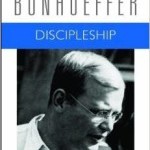 Discipleship by Dietrich Bonhoeffer. This work is better known in America as The Cost of Discipleship. Bonhoeffer’s collective ruminations on truly following Christ has been a spiritual classic for decades. I’ve started and stopped this work numerous times, largely because I find myself in such agreement that I think, “Ok, I get the point and I completely agree. Time to move on.” Just this week I finally made it all the way through to the end. Bonhoeffer’s main contribution to our understanding of discipleship is his taxonomy on grace: cheap grace versus costly grace. He says,
Discipleship by Dietrich Bonhoeffer. This work is better known in America as The Cost of Discipleship. Bonhoeffer’s collective ruminations on truly following Christ has been a spiritual classic for decades. I’ve started and stopped this work numerous times, largely because I find myself in such agreement that I think, “Ok, I get the point and I completely agree. Time to move on.” Just this week I finally made it all the way through to the end. Bonhoeffer’s main contribution to our understanding of discipleship is his taxonomy on grace: cheap grace versus costly grace. He says,
Cheap grace is the preaching of forgiveness without requiring repentance, baptism without church discipline, Communion without confession, absolution without personal confession. Cheap grace is grace without discipleship, grace without the cross, grace without Jesus Christ, living and incarnate.
After a prolonged meditation on discipleship Bonhoeffer proceeds to exposition of the Sermon on the Mount, which is followed by instruction on Matthew 10 and “The Messengers.” Bonhoeffer’s exegesis is questionable at points and his Lutheran convictions ring out in the book’s final section on the church. Nevertheless, this is a valuable work for our age that wonders if radical calls to obedience are necessary.
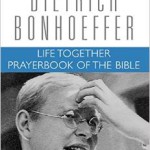 Life Together & Prayerbook of the Bible by Dietrich Bonhoeffer. From 1935-1937 the Finkenwalde seminary provided an occasion for Bonhoeffer to construct something he’d always longed for: the construction of a Christian community based on the Sermon on the Mount. As I read the book I couldn’t help but think of the Finkenwalde experiment as something like evangelical monasticism. Bonhoeffer created a routine of Scripture reading, prayers, meditation, work, singing, confession, and communion that would make the old monks proud. This is not to say I disagree with what Bonhoeffer built. I actually am quite sympathetic to his encouragement of systematically partaking of the means of grace. One thing a reader of Life Together can’t miss is Bonhoeffer’s prioritization of the Psalms for ordinary life in Christ. Thus, it only makes sense for this edition of Bonhoeffer’s Works to couple Life Together with The Prayerbook of the Bible, his brief commentary and application of the Psalms.
Life Together & Prayerbook of the Bible by Dietrich Bonhoeffer. From 1935-1937 the Finkenwalde seminary provided an occasion for Bonhoeffer to construct something he’d always longed for: the construction of a Christian community based on the Sermon on the Mount. As I read the book I couldn’t help but think of the Finkenwalde experiment as something like evangelical monasticism. Bonhoeffer created a routine of Scripture reading, prayers, meditation, work, singing, confession, and communion that would make the old monks proud. This is not to say I disagree with what Bonhoeffer built. I actually am quite sympathetic to his encouragement of systematically partaking of the means of grace. One thing a reader of Life Together can’t miss is Bonhoeffer’s prioritization of the Psalms for ordinary life in Christ. Thus, it only makes sense for this edition of Bonhoeffer’s Works to couple Life Together with The Prayerbook of the Bible, his brief commentary and application of the Psalms.
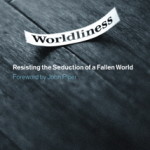 Worldliness: Resisting the Seduction of a Fallen World edited by C.J. Mahaney. Mahaney, in my view, is right to say, “Today, the greatest challenge facing American evangelicalism is not persecution from the world, but seduction by the world.” A common topic of discussion in centuries past, the issue of worldliness seems to have receded from the broader evangelical world today. With the big “L Word” (legalism) lurking around every corner few people seem concerned with the danger of loving the world. Yet Scripture unalterably warns against lurking worldliness (1 John 2:15-17). The Sovereign Grace men do a fantastic job in this book offering winsome counsel towards crucifying desires for the world. Resisting the temptation to offer unbiblical prescriptions, each chapter offers sound wisdom on matters of media, modesty, music, and living faithfully in the world. Highly recommended!
Worldliness: Resisting the Seduction of a Fallen World edited by C.J. Mahaney. Mahaney, in my view, is right to say, “Today, the greatest challenge facing American evangelicalism is not persecution from the world, but seduction by the world.” A common topic of discussion in centuries past, the issue of worldliness seems to have receded from the broader evangelical world today. With the big “L Word” (legalism) lurking around every corner few people seem concerned with the danger of loving the world. Yet Scripture unalterably warns against lurking worldliness (1 John 2:15-17). The Sovereign Grace men do a fantastic job in this book offering winsome counsel towards crucifying desires for the world. Resisting the temptation to offer unbiblical prescriptions, each chapter offers sound wisdom on matters of media, modesty, music, and living faithfully in the world. Highly recommended!
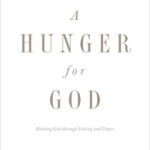 A Hunger for God: Desiring God through Fasting and Prayer by John Piper. One of my endeavors for 2015 is to grow in the practice of fasting. I turned to Piper’s book for counsel and encouragement in my own devotional life and he didn’t disappoint. A Hunger for God is classic Piper: rigorously biblical, deeply thoughtful, and occasionally loquacious. If you don’t want to read the whole book, at least pick up the free PDF here and read the first chapter, “Is Fasting Christian?”
A Hunger for God: Desiring God through Fasting and Prayer by John Piper. One of my endeavors for 2015 is to grow in the practice of fasting. I turned to Piper’s book for counsel and encouragement in my own devotional life and he didn’t disappoint. A Hunger for God is classic Piper: rigorously biblical, deeply thoughtful, and occasionally loquacious. If you don’t want to read the whole book, at least pick up the free PDF here and read the first chapter, “Is Fasting Christian?”
 A Serious Call to a Contemplative Lifestyle by Glenn Hinson. What a puzzle this slim volume volume is. For over thirty years Hinson was the professor of church history at The Southern Baptist Theological Seminary. But go ahead an throw out any notions of classic Baptist spirituality right now. Hinson advocates process theology, sympathetic to the evolutionary philosophy of Teilhard, and mystical in his orientation. His contemplative model of spirituality says, “God loves you. Love God back through contemplation on His loving essence.” I did enjoy his pleas for simplicity in life and the importance of meditative prayer, yet his almost utter disregard for God’s word as a means of grace makes his “serious call” . . . well, not that serious at all.
A Serious Call to a Contemplative Lifestyle by Glenn Hinson. What a puzzle this slim volume volume is. For over thirty years Hinson was the professor of church history at The Southern Baptist Theological Seminary. But go ahead an throw out any notions of classic Baptist spirituality right now. Hinson advocates process theology, sympathetic to the evolutionary philosophy of Teilhard, and mystical in his orientation. His contemplative model of spirituality says, “God loves you. Love God back through contemplation on His loving essence.” I did enjoy his pleas for simplicity in life and the importance of meditative prayer, yet his almost utter disregard for God’s word as a means of grace makes his “serious call” . . . well, not that serious at all.
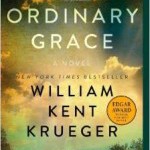 Ordinary Grace by William Kent Krueger. I’d seen Krueger’s latest novel on many “Best of 2014” lists, so I picked it up with high expectations and wasn’t let down. Set in New Bremen, Minnesota in the summer of 1961, Ordinary Grace is told through the eyes of Frank Drum – forty years after he experienced the events of 1961 as a somewhat rebellious thirteen-year-old. Several tragic deaths struck the quaint northern city that summer and we feel it through the emotions of the Drum household. As the death toll increases so does the angst and pain of investigating the loss of those you love. Krueger shows himself to be a master of pacing and well-textured characters. The “surprise” ending was foreseeable, and not totally believable, but don’t let that dissuade you from reading this one. A compelling read from start to finish.
Ordinary Grace by William Kent Krueger. I’d seen Krueger’s latest novel on many “Best of 2014” lists, so I picked it up with high expectations and wasn’t let down. Set in New Bremen, Minnesota in the summer of 1961, Ordinary Grace is told through the eyes of Frank Drum – forty years after he experienced the events of 1961 as a somewhat rebellious thirteen-year-old. Several tragic deaths struck the quaint northern city that summer and we feel it through the emotions of the Drum household. As the death toll increases so does the angst and pain of investigating the loss of those you love. Krueger shows himself to be a master of pacing and well-textured characters. The “surprise” ending was foreseeable, and not totally believable, but don’t let that dissuade you from reading this one. A compelling read from start to finish.
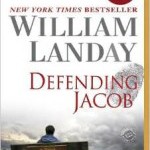 Defending Jacob by William Landay. I once saw a review calling Defending Jacob a near identical twin to Scott Turow’s genre-creating work Presumed Innocent. Such talk demands a personal investigation, so off I went to get my own copy of the latest book to receive “The Next Presumed Innocent” award. Defending Jacob is indeed strikingly similar in tone to Turow’s classic. But don’t call it a copycat. Landay’s book stands on its own merits – which are many – and it draws you in from the prologue. Andy Barber is the assistant district attorney of a New England suburb stunned by the brutal death of a young boy in a leafy city park. For Barber the death is even more shattering: his son Jacob is accused of being the murderer. Two questions consume the reader as Jacob’s arrest and trial unfold: 1) Is Jacob a sociopath in the making? 2) Or is he simply a troubled kid in the wrong place at the wrong time? People Magazine says, “The shocking ending1 will have readers pulling up their bedcovers to ward off the haunting chill.” Such sentiment is a wee bit strong, but Defending Jacob does stick with you.
Defending Jacob by William Landay. I once saw a review calling Defending Jacob a near identical twin to Scott Turow’s genre-creating work Presumed Innocent. Such talk demands a personal investigation, so off I went to get my own copy of the latest book to receive “The Next Presumed Innocent” award. Defending Jacob is indeed strikingly similar in tone to Turow’s classic. But don’t call it a copycat. Landay’s book stands on its own merits – which are many – and it draws you in from the prologue. Andy Barber is the assistant district attorney of a New England suburb stunned by the brutal death of a young boy in a leafy city park. For Barber the death is even more shattering: his son Jacob is accused of being the murderer. Two questions consume the reader as Jacob’s arrest and trial unfold: 1) Is Jacob a sociopath in the making? 2) Or is he simply a troubled kid in the wrong place at the wrong time? People Magazine says, “The shocking ending1 will have readers pulling up their bedcovers to ward off the haunting chill.” Such sentiment is a wee bit strong, but Defending Jacob does stick with you.
Click here to find other entries in the Recent Reads series.
—————————————————————————————————————–
- For the record, the ending wasn’t a shock at all. It’s easy to predict if you pay attention to Jacob’s relationships in the book. ↩
